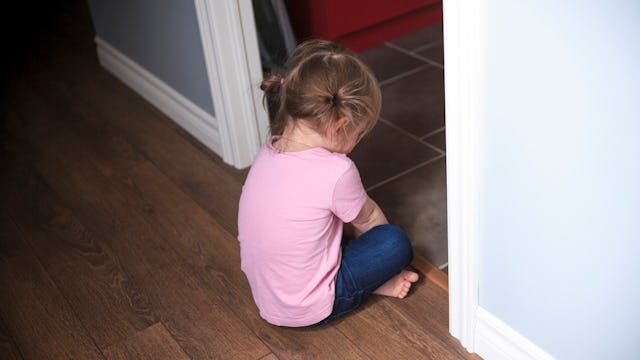AAP's New Policy On Spanking Is Their Harshest Stance Against It In 20 Years

AAP announces new policy that recommends absolutely zero physical and verbal abuse for kids
While the American Academy of Pediatrics (AAP) has “encouraged” parents not to spank their kids for the past two decades, a new policy statement released by the physicians group comes out with much stronger language against corporal punishment in children, including the use of abusive language.
“Aversive disciplinary strategies, including all forms of corporal punishment and yelling at or shaming children, are minimally effective in the short-term and not effective in the long-term,” the statement plainly outlines in the introduction. “With new evidence, researchers link corporal punishment to an increased risk of negative behavioral, cognitive, psychosocial, and emotional outcomes for children.”
RELATED: What Parents Need To Know About Negative Reinforcement
Physical punishment in this statement was defined as “any punishment in which physical force issued and intended to cause some degree of pain or discomfort, however light,” and includes smacking, slapping, spanking with the hand or with an implement. The list also included “kicking, shaking, or throwing children; scratching, pinching, biting, pulling hair, or boxing ears; forcing children to stay in uncomfortable positions; burning, scalding, or forced ingestion.”
More than that, non-physical punishment like “punishment which belittles, humiliates, denigrates, scapegoats, threatens, scares, or ridicules the child,” is also never recommended.
The policy statement is based on a growing mountain of research that shows that spanking, verbal abuse and any parenting that degrades or shames the child is not only ineffective, it’s also extremely harmful in the long term.
“The good news is, fewer parents support the use of spanking than they did in the past,” said Robert D. Sege, MD, PhD, and a past member of AAP Committee on Child Abuse and Neglect, an author of the policy statement. “Yet corporal punishment remains legal in many states, despite evidence that it harms kids – not only physically and mentally, but in how they perform at school and how they interact with other children.”
Much of the research used in creating the latest policy has been conducted in the last 20 years, since the AAP’s last statement on the subject. Here are just a few research highlights from the statement:
- A 2016 meta-analysis of over 160,000 children found that spanking is detrimental to children in a number of outcomes.
- Corporal punishment is associated with mental health problems and cognition issues in adults.
- A 2001 study found that physically punishing toddlers increases their aggression over time, and over the long-term (and that spanking and bad behavior spiraled downward over time).
- Corporal punishment increases the chances of serious injury in kids under 18 months.
- Corporal punishment makes kids more defiant in the future.
- Spanking was associated with suicide attempts, heavy drinking, and substance abuse in adults.
- Corporal punishment can lead to future dating violence.
- Spanking has similar mental and physical affects as other childhood traumas.
- Spanking is associated with actual changes in your brain, which can lead to reduced brain volume and lowered IQ performance.
- Spanking is associated with high stress hormones.
- Yelling and harsh verbal discipline are strongly linked to adolescent behavioral problems.
The statement included a survey that shows that the vast majority of medical doctors are already strongly against corporal punishment. Specifically, only 6 percent of practicing pediatricians endorse spanking, and only 2.5 percent think that it is effective. Over three quarters disagreed that spanking is the “only way” to get a child to behave, and 75 percent disagreed that spanking is “a normal part of parenthood.”
In their 1998 policy, “≤59 percent of pediatricians support the use of corporal punishment, at least in certain situations.”
The policy statement also gives recommendations to doctors and parents about how to find information about effective non-abusive child discipline strategies, such as using reasoning, teaching your children to process emotions, using positive reinforcement, taking away privileges, and using time-outs.
“There’s no benefit to spanking,” Dr. Sege concludes. “We know that children grow and develop better with positive role modeling and by setting healthy limits. We can do better.”
This article was originally published on